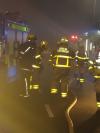Major Emergency Planning
Dublin Fire Brigade is prepared to deal with any type of major emergency. While they will probably never happen, Dublin City Council has a plan in place to address any situations that may arise.
What Is a Major Emergency?
According to the Government's Framework for Major Emergency Management, a major emergency is any event which causes or threatens injury or death, serious disruption of essential services or damage to property, the environment or infrastructure beyond the normal capabilities of the principal emergency services. It usually occurs with little or no warning and requires the mobilisation of additional resources to ensure an effective and coordinated response.
In line with the Government's framework, Dublin Fire Brigade is prepared for a coordinated interagency response to major emergencies resulting from local, regional or national events. Our team is ready to respond to major emergencies, such as fires, transportation incidents, hazardous substance incidents and severe weather events at local and regional levels.
Dublin City Council's Major Emergency Plan
Dublin City Council draws up and regularly revises a comprehensive major emergency plan for the city. The plan sets out arrangements for an effective and efficient response to a variety of scenarios, which could lead to the declaration of a major emergency.
The Dublin City Council Major Emergency Plan 2022 was prepared to facilitate the response to and recovery from major emergencies. The plan also ensures Dublin City Council’s arrangements are coordinated with those of the other designated principal response agencies - the HSE and An Garda Síochána.
This plan is based on the systems approach to Major Emergency Management, which involves a continuous cycle of activity. The full document can be downloaded below.
Planning and Preparation for Major Emergencies
Dublin City Council has an ongoing major emergency planning programme in place. The programme involves:
- Hazard analysis and risk assessment.
- Response planning.
- Recovery planning.
- Involvement in interagency training, exercises and regional forums.
Dublin Fire Brigade provides the primary response to emergencies in the city. Dublin City Council supports this response by providing, amongst others, the following functions:
- Co-ordinating the delivery of services from all Council departments.
- Making buildings, such as leisure and community centres, available to people displaced by an emergency.
- Providing a volunteer Civil Defence organisation - Read the Dublin Civil Defence Three Year Plan 2022-2025.
- Providing advice and assistance with clean up after a major flooding or pollution incident.
- Assessing structural damage to buildings.
- Co-ordinating and leading multiagency meetings to plan community recovery.
Meetings and Exercises
In light of the mass casualty incidents which have occurred across Europe, Dublin Fire Brigade in conjunction with An Garda Síochána and the HSE have attended Major Emergency Management planning groups and organised exercises around such incident types.
Dublin Fire Brigade also co-ordinates meetings and activities of the Dublin City Council Crisis Management Steering Group. As part of this work, it has carried out a review of the major emergency and severe weather plans.
Regional Co-operation
Dublin Fire Brigade has also played a major role in working with the East Regional Working Group (ERWG) to produce an annual Interagency Work Programme in line with the National Work Programme.
In addition, Dublin Fire Brigade actively participates in and chairs many of the ERWG sub-groups. They include:
- The Oil Pollution Regional Sub Group.
- The Planning and Strategy Sub Group.
- The Training and Exercise Sub Group.
- The Voluntary Emergency Services Sub Group.
- The Evacuation and Rest Centre Sub Group.
- The Seveso Sub Group.
- The Mass Casualty/Fatality Sub Group.
- The Media and Communications Sub Group.
- The Air Incident Sub Group.
Dublin Fire Brigade has also actively provided training and support to the local authority crisis management teams in the East Region. During recent storms, Dublin Fire Brigade and local authority staff from across a variety of departments were at the forefront of the response.
Advice to the Public
Major emergencies are very rare events but you can take steps to ensure you feel as safe and secure as possible. For more information and practical advice about how to cope in the event of a major emergency, check out the following resources:
- The Office of Emergency Planning website.
- Preparing for Major Emergencies Handbook.
- The RSA's Severe Weather Advice for Road Users.
- Met Eireann Weather Warnings Explained.
- Met Eireann Weather Warning Updates.
- List of HSE services currently affected by major emergencies.
For more advice, visit our page for Fire Safety in the Community.
Contact Dublin Fire Brigade
If you would like a fire officer to give a talk at your school, work or community centre, get in touch below.







